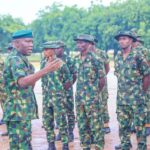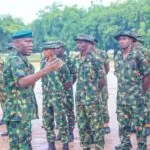
On Oct. 20, a social media post alleged that Lt. General Toareed Lagbaja, Nigeria’s former Chief of Army Staff (COAS), died of cancer while undergoing treatment abroad. The military swiftly dismissed the rumour, with the Defence Headquarters spokesperson Tukur Gusau clarifying that Lagbaja was on a “well-deserved rest” as part of his annual leave and will soon resume regular duties. However, public speculations intensified when, on Oct. 30, presidential spokesperson Bayo Onanuga announced the appointment of Major General Olufemi Oluyede as an acting COAS, pending the return of the indisposed substantive. Oluyede was promoted to Lieutenant General shortly after.
While Onanuga’s earlier statement suggested that Lagbaja’s absence could be prolonged, he announced the army chief’s passing on Wednesday morning, noting that Lagbaja died on “Tuesday night after a period of illness”. “President [Bola] Tinubu expresses his heartfelt condolences to the family and the Nigerian Armed Forces during this difficult time,” said Onanuga. Lagbaja was 56.
Lagbaja as army chief
Born on February 28, 1968, in Osun State, South West Nigeria, Lagbaja began his military journey in 1987 at the Nigerian Defence Academy (NDA) and was commissioned as a second lieutenant in the Nigerian Infantry Corps on September 19, 1992. President Tinubu appointed him Chief of Army Staff on June 19, 2023. A career soldier known for his ‘no-nonsense approach’, he led the Nigerian Army with a vision “to transform it into a well-trained, equipped, and highly motivated force,” crucial to tackling Nigeria’s security challenges.
Before becoming army chief, he had worked in different leadership capacities, including playing pivotal roles in numerous internal security operations such as Operation ZAKI in Benue State, Lafiya Dole in Borno, and Operation Forest Sanity across Kaduna and Niger States.
Lagbaja assumed command amid a complex landscape of security threats, including ISWAP and Boko Haram insurgencies, IPOB activities, banditry, oil theft, and persistent herder-farmer clashes. Under his leadership, the army made notable advances in combating these issues, successfully mounting offensives against insurgent and criminal elements.
In February, Nigerian Army troops neutralised Boderi Isyaku, a notorious bandit, along with his fighters in Kaduna. By June, the army’s Operation Whirl Punch eliminated Buhari Alhaji Halidu, alias Buhari Yadi, a key bandit leader who had terrorised communities across northwestern Nigeria. Other high-profile figures—including Dogo Rabe, Kachalla Dan Chaki, Dogo Gudali, and Rufai Maikaji—were also neutralised, demonstrating the army’s focused efforts in the region.
In the past year, these operations continued to dismantle terrorist strongholds across the Northwest, resulting in the deaths of notorious leaders such as Halilu Sububu, a criminal responsible for hundreds of deaths and the displacement of thousands in communities like Maradun, Faru, Kaura Namoda, and Bakura. Lagbaja’s tenure left a lasting impact, with his strategic leadership earning the Nigerian Army recognition for its resilience and ongoing commitment to restoring peace.
Some soldiers who spoke with HumAngle also said Lagbaja was dedicated to their welfare and had encouraged them to do better in several outings.
The army under Lagbaja’s leadership also provided critical humanitarian support. In September, when devastating floods swept Maiduguri, Borno State’s capital, the military’s swift response was widely praised on social media under the hashtag #ThankASoldier.
Terrorists still control strongholds.
Despite these gains, violent crime and terrorist control remain entrenched in parts of Nigeria’s north and south. The Armed Conflict Location and Event Data Project, a global non-profit organisation tracking violent conflict and protests, reported that over 11,000 people, including soldiers, were killed during Lagbaja’s time as army chief.
Conflict-prone areas also saw a series of extrajudicial killings, displacements and kidnappings.
A review by HumAngle of the Nigerian Army’s social media pages indicates that Lagbaja’s last public appearance was on Tuesday, Sept. 10, 2024, when he inaugurated several civil-military cooperation projects in Okuku, Odo-Otin Local Government Area of Osun state.
Since then, senior military officers stood in for him at crucial events. On Sept. 28, he missed the combined passing-out parade of the 71 Regular Course, Army, Navy, and Air Force. The event was done to mark the graduation of Direct Short Service Course 28 (Army) and Direct Short Service Course 32 (Air Force) cadets from the NDA.
Questions around Lagbaja’s absence grew when he missed the 1 October Independence Day celebrations at Aso Rock and the graduation dinner of the Army War College Nigeria Course 8/2024 in Abuja on 2 October, where he was expected to serve as the chief host. Silence from the military only ended on 19 October, when army spokesperson Onyema Nwachukwu revealed that Lagbaja was unwell and receiving treatment abroad.
There was no official update on his return until the announcement of his death on Wednesday, making him the second army chief to die in office within the last three years.
Nigeria’s President announced the passing of the country’s Chief of Army Staff, Lt. General Taoreed Lagbaja, who died after an illness. Lagbaja, appointed in June 2023, was known for his decisive leadership and was dedicated to transforming the army to address various security challenges, such as insurgencies and banditry.
Throughout his tenure, Lagbaja led crucial security operations against notorious criminals and provided humanitarian aid, notably during the Maiduguri floods. Despite successes, violent crime and terrorism persist, with over 11,000 deaths reported during his leadership.
Lagbaja’s absence from public and military events initially raised questions, later revealed to be due to medical treatment abroad. His death marks him as the second army chief to die in office in the past three years.
